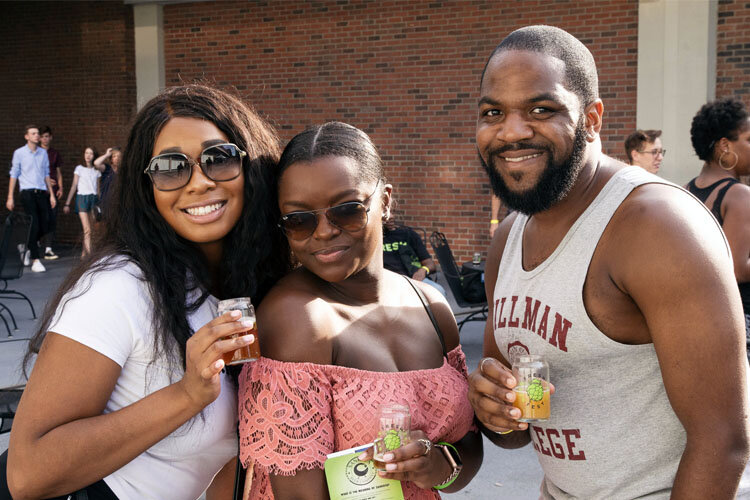Photo courtesy of Epicast/Drinking Partners Podcast
THE GIST
On June 17, a simmering dispute between the two co-founders of Fresh Fest, the nation’s first Black beer festival, became public. Day Bracey and Mike Potter each wrote a Facebook post accusing the other of—in essence—breach of contract. (Potter’s post has since been deleted.) The two confirm they are engaged in litigation over assets and finances related to the festival, but would not disclose how much money is at stake.
Despite the legal dispute, Bracey says the Pittsburgh-based festival will continue its mission of “building a table for Black people in the beer community.” Due to COVID-19, this year’s Fresh Fest will be a digital event called DigiFest, which will take place Aug. 8.
Bracey tells Good Beer Hunting he finally decided to make this split public so that vendors, brewers, and artists know “if you’re talking to [Potter], any promises he’s made, I’m not responsible for.” Bracey says they began talks to dissolve their partnership in September 2019, following the second Fresh Fest, and that this past January, Potter agreed to a financial contract that would give Bracey full control of the festival in exchange for a buyout. (The terms of the buyout have not been disclosed.) Since then, according to Bracey, Potter has refused to turn over social media and website passwords as well as financial documents related to the festival. Because Bracey didn’t have access to Fresh Fest’s website, he says, DigiFest has an entirely separate online presence.
Potter countered in his since-deleted post that Bracey “lied, stole, and breached every contract we’ve had in place.”
Potter declined an interview request from Good Beer Hunting, but did respond with a statement:
“It's unfortunate that Mr. Bracey has placed himself in such a polarizing position, but we have no interest in magnifying his dysfunction through the media or any other platform,” he wrote. “We are currently in litigation with [Bracey] … with regards to Fresh Fest Beer Fest LLC and Fresh Fest DigiFest and will allow that process to assist us in enforcing our contacts.”
Bracey agrees he doesn’t want the public dispute to go on as the work of organizing this year’s event continues.
“I don’t want to continue to go back and forth in public about it anymore. I plan on letting the courts decide what was legal.”
WHY IT MATTERS
In just two years, Fresh Fest became one of the most important beer festivals in the country. It drew about 3,000 attendees in 2019, and carried great influence in an American beer scene working on new paths for diversity and inclusion. The event reimagines the traditional beer festival by showcasing Black-owned breweries and bringing together more artists, musicians, and other non-beer elements. A 2019 survey by the Brewers Association gave credence to what beer festivals have long shown: because around 90% of brewers and owners of breweries are White, there is often a severe lack of diversity of brewery staff pouring at some events.
In past years, Fresh Fest included exclusive collaboration beers. This year’s DigiFest expands the potential audience for the event, allowing attendees to digitally join from anywhere in the world.
As the beer industry has struggled to attract and retain Black and other minority talent and consumers, Fresh Fest has been a vital corrective. News of the cofounders’ litigation called the fate of such an important event into question, but Bracey is adamant that Fresh Fest is not going anywhere.
“Fresh Fest has always been bigger than me and Mike,” he says. “Even if both of us died in an accident somewhere, there would still be a whole community to carry this on. That’s how it was built.”
Planning for DigiFest will continue. Because of the growing rift between Bracey and Potter, Bracey says he’s largely been planning this year’s festival autonomously. Bracey says attendees can expect the same level of programming Fresh Fest has provided in past years, including livestreamed art, music, deejays, podcasts, brewing, cooking, and speakers across five digital “channels.” Collaboration beers created by Black-owned breweries and in partnership with Black members of the beer industry for the festival will be available for purchase through Tavour and Beverages2U. Bracey emphasizes the importance of the festival continuing in digital form so it can support Black breweries and artists during a recession.
Breweries and other companies looking for a way to support Black and other minority participation in the beer industry can sponsor or donate to Fresh Fest, Bracey says. But he encourages breweries to consider more local action and support Black people in their own communities.
“By all means, buy tickets and sponsorships and come to the festival next year. But none of that is going to have as much impact as a White person in beer going into the Black community and starting a relationship of some sort and figuring out ways to support that local community,” he says.
That local partnership creates a more meaningful connection that hopefully extends beyond just a one-time festival. Especially as the industry confronts the ways in which it has failed to live up to the demands of the Black Lives Matter movement, Fresh Fest’s role is more important than ever.
“I see the beer industry posting black squares on social media, and don't get me wrong, that's a start. But the beer industry can actually reach out to some Black folks to see how they can collaborate for mutual benefit, not just charity.”
That’s what Bracey wants the industry to focus on, not the Fresh Fest litigation. The festival’s mission, he promises, is strong enough to transcend the dispute.


